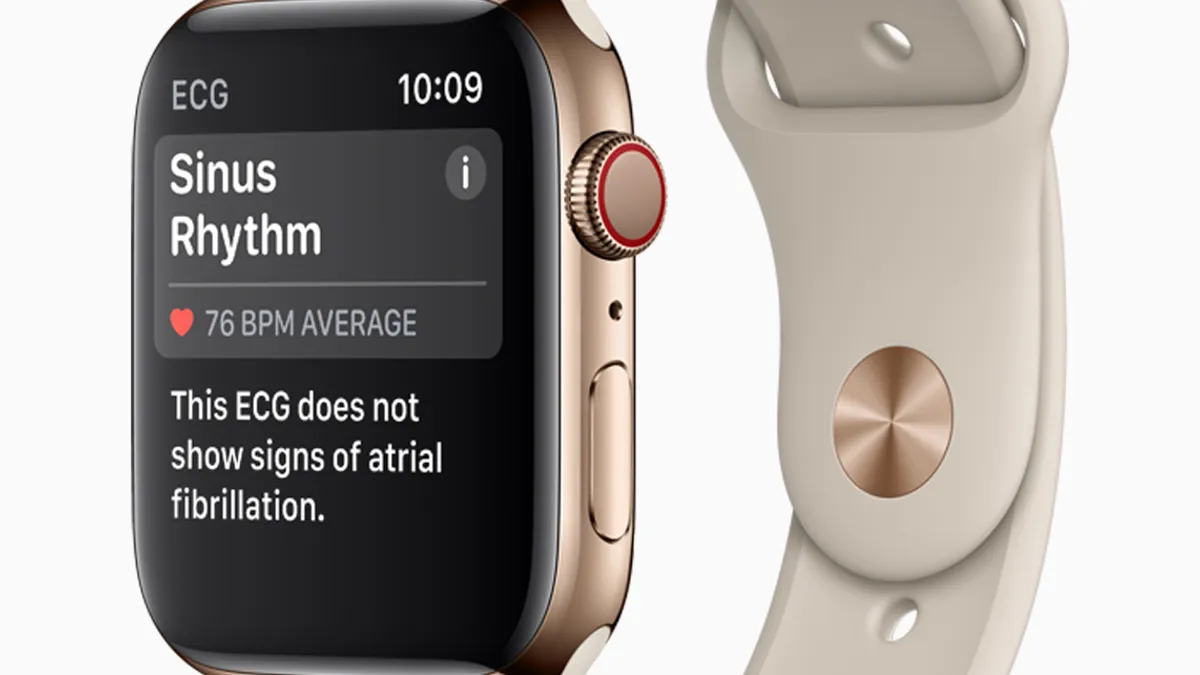Dive Brief:
- Apple stepped further into the healthcare arena on Wednesday, touting FDA approval of a first-of-its-kind electrocardiogram monitor embedded in its latest Apple Watch.
- The ECG app, cleared though the agency's Center for Devices and Radiological Health's De Novo pathway, has been classified as a Class II medical device by the agency. It is indicated for over-the-counter use, but the agency notes in its approval letter that it is not intended for those under the age of 22.
- Separately, Apple also received a De Novo clearance for an application meant to identify irregular hearth rhythms that may suggest atrial fibrillation. The application provides an alert to users, but Apple COO Jeff Williams and the approval letter both noted that it will not catch every instance of AFib.
Dive Insight:
FDA Commissioner Scott Gottlieb and CDRH Director Jeff Shuren praised Apple's work with the agency during software development, calling it indicative of the innovation FDA would facilitate in its proposed Center of Excellence for Digital Health.
"The FDA worked closely with the company as they developed and tested these software products, which may help millions of users identify health concerns more quickly. Health care products on ubiquitous devices, like smart watches, may help users seek treatment earlier and will truly empower them with more information about their health," Gottlieb and Shuren said in a joint statement.
But the ECG App has limitations, according to FDA. The data is not intended for diagnosis, and is not recommended for users with other known arrhythmias.
"The ECG waveform is meant to supplement rhythm classification for the purposes of discriminating AFib from normal sinus rhythm and not intended to replace traditional methods of diagnosis or treatment," wrote Angela Krueger, deputy director of CDRH's Engineering and Science Review Office of Device Evaluation.
Further, false positives resulting in unneeded procedures and false negatives that miss actual diagnoses are a risk, the FDA said in its letter.
Apple notes that that any readings from the applications are stored in its Health app in a PDF that can be shared with a physician. "The user is not intended to interpret or take clinical action based on the device output without consultation of a qualified healthcare professional," Krueger said.
Ethan Weiss, a cardiologist at the University of California San Francisco, told MedTech Dive that the utility of Apple's ECG App is heavily dependent on how specific the application is.
"If it is scaring people and having them email their doctors all the time, it's going to be a big burden," Weiss said. "I think there is going to be an increase in the number of things that we all see, that isn't necessarily bad, it could be great."
AliveCor, which received FDA clearance for its KardiaBand application for use with Apple Watch last November, is set to face heavy competition now that Apple has integrated a similar product directly into its newest Apple Watch. But earlier this week AliveCor gained breakthrough device status from FDA for a software platform that aims to screen for hyperkalemia, or elevated blood potassium levels.
Another feature from the new Apple Watch monitors users for hard falls. According to Apple, the watch will give the user a chance to dismiss an alert before calling emergency services after 60 seconds. With the ECG App and its AFib feature, it appears that Apple is making a play for older consumers with its newest offering.
Apple has not hidden its interest in the healthcare market, but the announcements Wednesday show the tech giant is not hesitating to plunge in.
In a recent move, Apple opened its Health Records API to developers with the hope of seeing more apps using health data to manage medications and diagnose diseases. It has also been working on its personal health record capabilities and is partnering with an ever-growing list of hundreds of hospitals and clinics to allow users to see medical data on their phones.
While the ECG App is a splash, Apple has signaled interest in other areas, such as detection of conditions like sleep apnea. Last year Apple bought sleep tracker startup Beddit, which develops products that can relay heartbeat and breathing rhythm data.
Another potential growth area is diabetes management. CNBC reported earlier this year that Apple has a team of engineers working to develop noninvasive blood sugar monitors. The digital diabetes market tripled in total revenue to nearly $100 million last year, and could be worth $742 million by 2022, according to a recent report from Research2Guidance.
Apple is also rolling out two primary care clinics for employees at its headquarters, joining the list of major companies looking to work directly with providers to cut down on employee health care costs.
Editors' note: This story has been updated with additional background.












